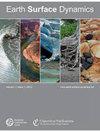Introducing standardized field methods for fracture-focused surface process research
IF 2.9
2区 地球科学
Q2 GEOGRAPHY, PHYSICAL
引用次数: 0
Abstract
Abstract. Rock fractures are a key contributor to a broad array of Earth surface processes due to their direct control on rock strength as well as rock porosity and permeability. However, to date, there has been no standardization for the quantification of rock fractures in surface process research. In this work, the case is made for standardization within fracture-focused research, and prior work is reviewed to identify various key datasets and methodologies. Then, a suite of standardized methods is presented as a starting “baseline” for fracture-based research in surface process studies. These methods have been shown in pre-existing work from structural geology, geotechnical engineering, and surface process disciplines to comprise best practices for the characterization of fractures in clasts and outcrops. This practical, accessible, and detailed guide can be readily employed across all fracture-focused weathering and geomorphology applications. The wide adoption of a baseline of data collected using the same methods will enable comparison and compilation of datasets among studies globally and will ultimately lead to a better understanding of the links and feedbacks between rock fracture and landscape evolution.为以断裂为重点的表面过程研究引入标准化现场方法
摘要。岩石裂缝对岩石强度、岩石孔隙度和渗透性具有直接控制作用,是一系列地球表面过程的关键因素。然而,迄今为止,地表过程研究中的岩石裂缝量化还没有标准化。在这项工作中,我们提出了在以裂缝为重点的研究中实现标准化的理由,并对之前的工作进行了回顾,以确定各种关键数据集和方法。然后,提出了一套标准化方法,作为地表过程研究中基于断裂研究的起始 "基线"。这些方法已在结构地质学、岩土工程学和地表过程学等学科的已有研究中得到证实,是岩屑和露头裂缝特征描述的最佳实践方法。本指南实用、易懂、详细,可在所有以断裂为重点的风化和地貌学应用中随时使用。通过广泛采用相同方法收集的基准数据,可以对全球范围内的研究数据集进行比较和汇编,最终可以更好地了解岩石断裂与地貌演变之间的联系和反馈。
本文章由计算机程序翻译,如有差异,请以英文原文为准。
求助全文
约1分钟内获得全文
求助全文
来源期刊

Earth Surface Dynamics
GEOGRAPHY, PHYSICALGEOSCIENCES, MULTIDISCI-GEOSCIENCES, MULTIDISCIPLINARY
CiteScore
5.40
自引率
5.90%
发文量
56
审稿时长
20 weeks
期刊介绍:
Earth Surface Dynamics (ESurf) is an international scientific journal dedicated to the publication and discussion of high-quality research on the physical, chemical, and biological processes shaping Earth''s surface and their interactions on all scales.
 求助内容:
求助内容: 应助结果提醒方式:
应助结果提醒方式:


